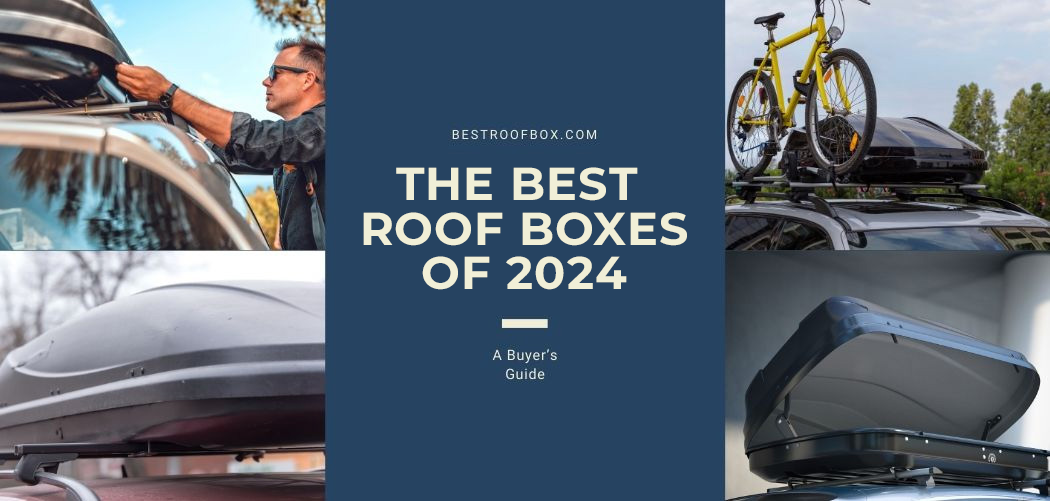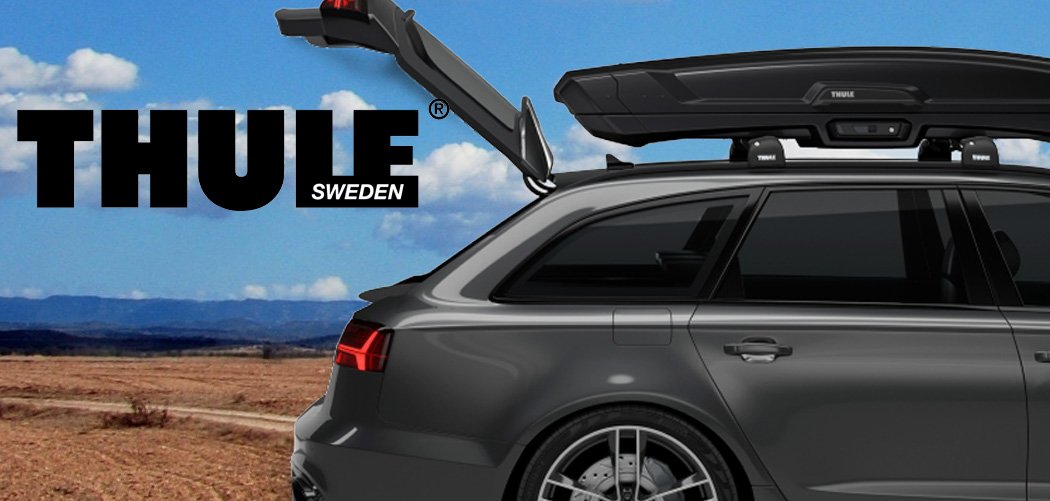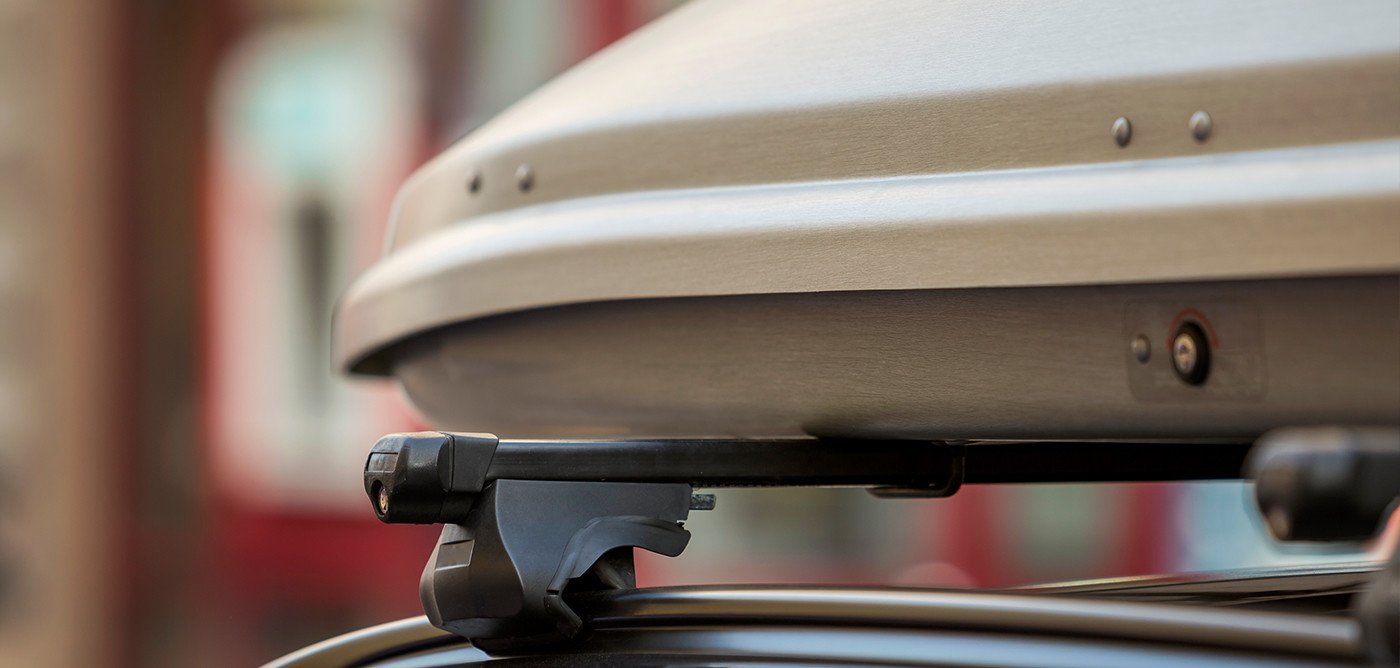Know the 10 roof box pros and cons before buying your next top cargo carrier.
Everywhere you go, it is easy to find cars and vans that have rooftop carriers to store their snowboards, fishing poles, and even their luggage. There are many types of roof boxes and each of them has its own advantages and disadvantages.
If you’re considering purchasing one of these boxes and you aren’t sure if it will suit your needs, not to worry because there are ways to learn about the pros and cons of these items.
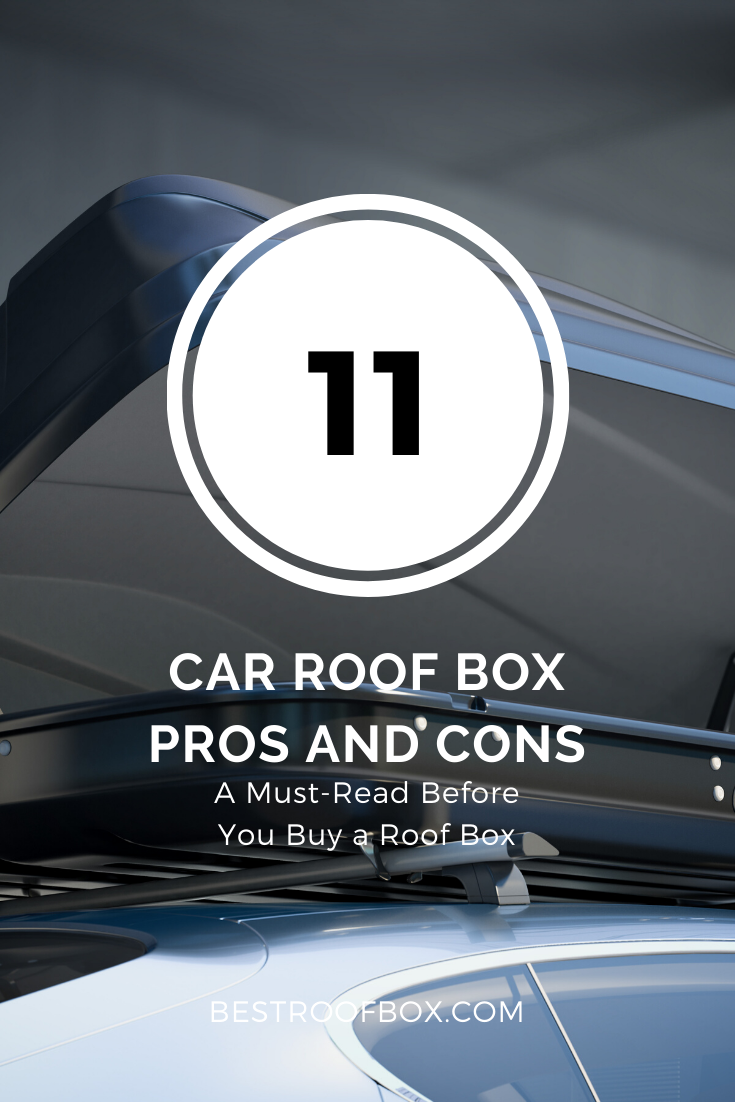
Learning the roof box pros and cons can help you sort through all of the available information so that you can decide for yourself if this product is best for you.
Making an informed decision about roof boxes has never been easier, because all you have to do is read the details about roof boxes so that you can decide to purchase one for your vehicle.
Table of Contents
Roof Box Pros and Cons
Roof Box Pros
1. They Provide Extra Space
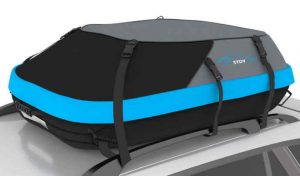 Let’s face it, the main advantage to having a rooftop box is the extra space it provides. When you vacation, you likely do so with the entire family in the car, or at least a few extra friends, and the space in your vehicle may not be enough to accommodate all of your luggage and gear.
Let’s face it, the main advantage to having a rooftop box is the extra space it provides. When you vacation, you likely do so with the entire family in the car, or at least a few extra friends, and the space in your vehicle may not be enough to accommodate all of your luggage and gear.
If you’re headed out to the ski slope or the fishing camp, taking along things such as snowboards and fishing poles can be cumbersome if you plan to place these things inside your vehicle. With a rooftop carrier of some type – whether box, bag, or basket – you can place items such as these on the carrier and, therefore, leave much more room inside of the car.
Rooftop carriers come in sizes that range from around 10 cubic feet to those that can accommodate up to 20 cubic feet of space, and when you think about it, that’s a lot of extra room to add to your vehicle!
Adding extra space is a huge convenience if you’re planning to be away for long periods of time, but with a rooftop carrier you’ll always have the extra room you need.
2. It Is There When You Need it
Roof boxes are easy to remove when you’re not using them, but if you don’t want the hassles associated with installing and removing them on a continuous basis, you can just leave them on all year long.
Although it’s true that they will affect your gas mileage to a degree, the results aren’t that severe if the box is empty, so leaving them on all the time isn’t exactly a bad idea.
When it comes to roof box pros and cons, it is good to remember that these boxes are always there when you need them, and that makes them perfect for an impromptu weekend or day trips that you need to take sometimes.
Leaving them on your roof means you can head out at any time and take the trip you deserve, because all you have to do is throw some suitcases into the rooftop carrier and be on your way!
3. They Are Great Investments
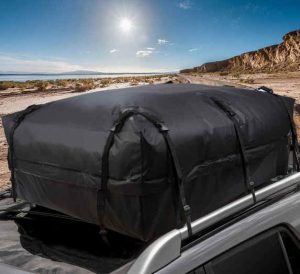 Contrary to what many people believe, roof boxes can be great investments because most of them are made out of extremely sturdy materials that are not only meant to last, but also won’t fade, crack, or tear over time.
Contrary to what many people believe, roof boxes can be great investments because most of them are made out of extremely sturdy materials that are not only meant to last, but also won’t fade, crack, or tear over time.
Many roof boxes are made out of heavy-duty materials and contain materials that are rust- and UV-resistant, and many are even waterproof, making all of these items long-lasting products.
Although most roof boxes are also very reasonably priced, it is good to know that all of them are built to last, so whether you’ve paid under $100 for your roof box or several hundred dollars, you can rest assured you’ll be able to enjoy that roof box for many years to come.
Most of them are also easy to move from one vehicle to another, so if you sell your car, not to worry – you can simply remove your roof box and use it for the next vehicle you purchase!
4. They Are Great for Mobile Lifestyles
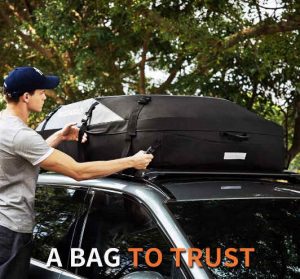 Many people have mobile lifestyles, and if you enjoy a mobile life, you might as well have a vehicle that can accommodate you.
Many people have mobile lifestyles, and if you enjoy a mobile life, you might as well have a vehicle that can accommodate you.
From musicians who have to carry around large musical instruments from one gig to another to hairdressers who work independently and need extra space for their equipment, a rooftop carrier can be a true miracle-worker every time.
In fact, if you choose a bag-type rooftop carrier, it is even easier to store oddly shaped items such as guitars, hair dryers, and sporting equipment, so this may be the type you should look for if you’re in this situation and need a large rooftop carrier that can accommodate items of all shapes and sizes.
These bag carriers aren’t just for business people, either, because soccer moms, coaches, and teachers can find a lot of uses for them as well.
5. They Are Great for Sporting Adventures
 Hopping in your vehicle and heading out to the ski slopes or your favorite fishing spot are great activities that millions of people enjoy, and having a great rooftop carrier can make it easier to carry the things you need to make that trip a success.
Hopping in your vehicle and heading out to the ski slopes or your favorite fishing spot are great activities that millions of people enjoy, and having a great rooftop carrier can make it easier to carry the things you need to make that trip a success.
In fact, no list of roof box pros and cons is complete without this aspect of having a rooftop carrier, especially if you purchase one that is extra large and made out of extra-thick materials for even more durability.
People that rely on their rooftop carriers for their sporting adventures use these bags and boxes for snow skis, snowboards, fishing gear of all sorts, and even baseball bats and basketballs.
Remember, you can store much more equipment and accessories than you think in one of these carriers, so the next time you have a sporting vacation planned, go ahead and load up your carrier with the things you’ll need most. You’ll be surprised by how much easier the trip will be!
6. It Keeps Your Belongings Much Safer
 Many people are concerned about the safety of their belongings once they’re placed in one of these carriers, but there is no need for concern.
Many people are concerned about the safety of their belongings once they’re placed in one of these carriers, but there is no need for concern.
Most of these carriers come with a lock-and-key system that makes certain your belongings are safe from theft at all times.
Let’s face it, a would-be thief will never guess that you’re storing something valuable in your rooftop carrier, so go ahead and load that expensive ski equipment or tackle box in the carrier, then forget about its safety!
This doesn’t mean that rooftop carriers are fool-proof because if a burglar really wants to get inside of it, they will find a way. It just means that in most cases, a thief won’t have a clue if what you’re storing there is valuable or not.
Between this and the fact that the locks and keys used in the carriers are sturdy and reliable, you can essentially forget about something getting stolen from your carrier in most cases.
Roof Box Cons:
1. Carriers Affect Gas Mileage
 Regardless of the type of vehicle you own, having a rooftop carrier is going to affect your gas mileage. Aerodynamic rooftop boxes provide a little less drag and, therefore, provide better gas mileage as you travel, but you are still going to use more gas than you would without the carrier attached to your vehicle. In some cases, the reduction in gas mileage can be as high as 25% or more.
Regardless of the type of vehicle you own, having a rooftop carrier is going to affect your gas mileage. Aerodynamic rooftop boxes provide a little less drag and, therefore, provide better gas mileage as you travel, but you are still going to use more gas than you would without the carrier attached to your vehicle. In some cases, the reduction in gas mileage can be as high as 25% or more.
Naturally, there are other factors that fit into the equation, such as the type of vehicle you own and the size of the carrier itself. But when you’re considering roof box pros and cons, this is one fact that you have to take into consideration because with any type of carrier – even the smaller ones – your gas mileage is definitely going to be affected, and always in a negative way.
Keeping fewer belongings in the carrier and driving at or below the speed limit can help you get better mileage, but it will never be as good as when you travel sans rooftop carrier.
2. They Can Be Quite Expensive
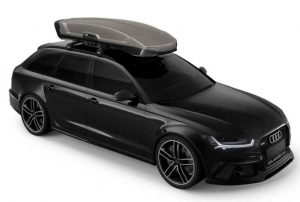 Rooftop carriers can be as inexpensive as $50 or cost you nearly $700, and even though the expensive ones are built to last for a very long time, it can still be hard on your wallet to fork over that much cash when you need a well-made rooftop carrier for your vehicle.
Rooftop carriers can be as inexpensive as $50 or cost you nearly $700, and even though the expensive ones are built to last for a very long time, it can still be hard on your wallet to fork over that much cash when you need a well-made rooftop carrier for your vehicle.
There are things you can do to counteract this – such as buying a bag instead of a box carrier and comparing prices on different websites – but if you want a high-quality carrier that you’ll be able to enjoy for some time, be prepared to pay a lot of money for it.
In general, you should be prepared to pay several hundred dollars for the cargo carrier you want, but again, it is good to remember that these days the carriers are made out of top-notch materials that do a great job withstanding the elements, making them a great deal overall.
3. It May Not Be a Justifiable Purchase
 Since rooftop carriers can be a bit pricey, you should consider how often you’ll actually be using yours before you purchase one.
Since rooftop carriers can be a bit pricey, you should consider how often you’ll actually be using yours before you purchase one.
Reviewing roof box pros and cons usually brings you to this one because let’s face it, the last thing you want to do is purchase a roof box and then find that you’re rarely using it afterwards.
You can always start with a small, 10-cubic-foot rooftop carrier if you like, just to give you an idea of how often you use it, and this is actually a great suggestion. If you find you’re using your carrier quite often, you can always move up to a higher-quality and more expensive one in the future.
Rooftop carriers come in all sizes and price ranges, but with every single one of them, determining how often you’ll use yours and the price you’ll end up paying for it are two very important considerations. You just have to make sure the money you spend on the carrier is always worth it in the end.
4. It Makes Travel to Certain Places More Difficult
 As you likely already know, rooftop carriers are bulky and take up a lot of room. This can make it difficult in certain circumstances, including driving under bridges and overpasses that are on the low side.
As you likely already know, rooftop carriers are bulky and take up a lot of room. This can make it difficult in certain circumstances, including driving under bridges and overpasses that are on the low side.
In fact, many people have ruined their carriers simply by forgetting they are on top of the vehicle and driving under a bridge or overpass anyway. You can just imagine how doing this could ruin one of your beloved rooftop carriers.
If you do purchase and install a carrier, you’d be wise to measure it so that you know how much higher it is making your vehicle. Keep this number in mind at all times to make sure you don’t accidentally damage your carrier, which can cost you a lot of money and be quite a headache as well. As long as you’re paying attention as you drive, however, you should be just fine.
5. Some Carriers Can Be Hard to Handle

Last, but not least, on the list of roof box pros and cons it is always important to mention that loading and unloading a carrier is often cumbersome and even difficult.
In fact, many of the manufacturers of these carriers now recommend that you find another person to help you whenever you’re installing crossbars, attaching the carrier to your vehicle, and even when removing the carrier later on.
Carriers, especially the larger ones and the bags, can be difficult to maneuver and time consuming to install or remove. In addition, once you load your belongings onto the carriers, they are quite heavy, which makes working with them even more difficult.
If you have someone around to help you, this is not a problem, but many people find that installing or removing a rooftop carrier on their own is very difficult.
For this and many other reasons, many people choose not to purchase a rooftop carrier, but to use other storage methods instead.

